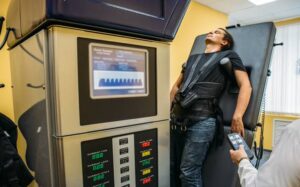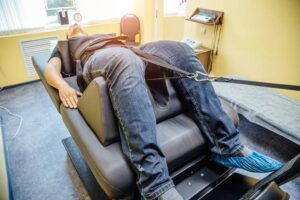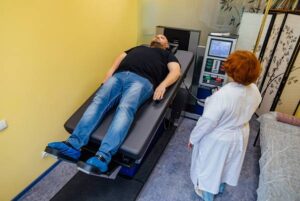In the realm of conservative spine care, non-surgical spinal decompression has emerged as a groundbreaking method for treating disc-related issues, particularly lumbar and cervical disc herniations. For many, living with back pain can significantly affect daily life, limiting mobility, affecting work performance, and impacting overall well-being. For those suffering from conditions such as herniated discs, the search for effective treatment options can be overwhelming. This is where non-surgical spinal decompression shines as a beacon of hope.
Understanding Disc Herniation and Its Impact
A disc herniation occurs when the inner gel-like substance of the disc, known as the nucleus pulposus, bulges or leaks out through a tear in the outer layer (annulus fibrosus). This condition can lead to nerve compression, resulting in a range of debilitating symptoms, including:
- Lower Back Pain: This is often localized but can radiate into the hips and legs, making daily activities challenging.
- Sciatica: Radiating pain that travels down the leg, typically along the sciatic nerve, can cause discomfort from the lower back to the foot.
- Neck Pain: In cases of cervical disc herniation, individuals may experience significant neck pain, stiffness, and difficulty with movement.
- Numbness or Tingling: Patients may report sensations of tingling or numbness in the arms or legs, indicating nerve involvement.
The standard course of treatment for disc herniation often includes physical therapy and pain management. However, many patients seek additional relief, especially when conservative methods fall short or lead to limited improvement in their symptoms.
Non-Surgical Spinal Decompression: A Non-Invasive Solution

Non-surgical spinal decompression has emerged as a powerful, non-invasive treatment for those suffering from chronic disc-related pain. Utilizing advanced equipment like the DRX-9000, this FDA-cleared technology offers targeted, gentle spinal decompression therapy. This approach works by gradually stretching the spine, creating negative pressure within the affected discs. This negative pressure allows herniated or bulging disc material to retract, taking pressure off surrounding nerves and promoting an influx of nutrients and fluids that can accelerate healing.
During the procedure, patients lie comfortably on a table designed to allow precise adjustments, which target specific areas of the spine in need of decompression. Unlike more aggressive surgical solutions, the DRX-9000 allows for customized treatment based on each patient’s unique condition. Sessions are short and comfortable, and many patients report relief and improved function after only a few visits.
The DRX-9000 has become an essential tool for those seeking relief without the risks or downtime associated with surgery. By restoring proper spinal alignment and reducing disc-related pressure, non-surgical spinal decompression supports natural healing and enhances mobility, allowing individuals to return to their daily lives with less pain and improved physical function.
How Non-Surgical Spinal Decompression Works

- Gentle Spinal Stretching:
The DRX-9000 device allows for controlled decompression of the spine, creating a negative intradiscal pressure. This negative pressure can help to draw the herniated material back into the disc space, allowing for natural healing. - Increased Blood Flow:
The decompression process enhances blood circulation to the affected area, promoting nutrient exchange and healing. Improved blood flow helps to flush out toxins and deliver essential nutrients to damaged tissues. - Reduced Pain and Inflammation:
By alleviating pressure on the nerves, patients often experience a significant reduction in pain and inflammation associated with disc herniation. This not only improves comfort but also enhances the overall quality of life. - Facilitated Natural Healing:
Spinal decompression supports the body’s natural healing processes, allowing for improved recovery without the risks associated with surgery. Many patients find that they can return to their daily activities much quicker than expected.
Benefits of Non-Surgical Spinal Decompression

Patients have reported numerous benefits from non-surgical spinal decompression, including:
- Reduced Pain and Discomfort: Many patients experience immediate relief from pain and discomfort after treatment sessions.
- Improved Mobility and Flexibility: Enhanced spinal alignment often leads to greater flexibility and improved range of motion.
- Enhanced Overall Quality of Life: Patients frequently note a marked improvement in their ability to engage in daily activities, hobbies, and sports.
- A Non-Invasive Alternative to Surgery: This method provides a safe alternative to surgical interventions, which can come with a host of risks and longer recovery times.
- Minimal Side Effects: Unlike invasive procedures, spinal decompression therapy generally has very few side effects, making it suitable for a wide range of patients.
Is Non-Surgical Spinal Decompression Right for You?
Non-surgical spinal decompression offers a viable solution for those with chronic back pain and specific spine conditions. Here are factors to consider:
- Who May Benefit: Non-surgical decompression may be particularly beneficial for patients with herniated or bulging discs, degenerative disc disease, sciatica, spinal stenosis, or failed back surgery syndrome.
- Factors to Consider: Conditions such as severe osteoporosis, fractures, or advanced arthritis may make spinal decompression unsuitable.
- Commitment to Treatment: Decompression therapy is cumulative, often requiring multiple sessions over several weeks.
- Low Risk of Side Effects: Compared to surgical options, non-surgical spinal decompression is associated with minimal side effects, generally limited to mild soreness after sessions, which typically resolves within a few hours.
Conclusion

Non-surgical spinal decompression is revolutionizing the way we approach pain relief for disc-related issues. Our commitment to utilizing advanced technology and individualized treatment plans ensures that patients receive the care they need to heal effectively and efficiently.
If you or someone you know is struggling with disc-related pain, we invite you to schedule a consultation with our team. Together, we can explore the best non-invasive options to get you back to living life without pain.
At northdallasspinecenter we are dedicated to staying at the forefront of spinal care and continuously evolving our techniques and treatments to provide the best possible outcomes for our patients. Experience the difference that non-surgical spinal decompression can make in your life—because everyone deserves to live pain-free.
Citations:
[2] https://arthritis-research.biomedcentral.com/articles/10.1186/s13075-018-1743-4
[3] https://www.nyp.org/advances-orthopedics/investigating-inflammatory-cytokines-in-disc- herniation
[4] https://pubmed.ncbi.nlm.nih.gov/9726337/
[5] https://www.aans.org/patients/conditions-treatments/herniated-disc/

